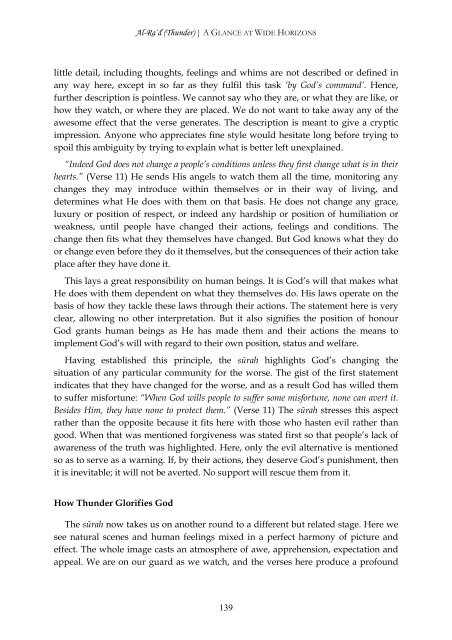Volume 10 Surah 12 - 15 - Enjoy Islam
Volume 10 Surah 12 - 15 - Enjoy Islam
Volume 10 Surah 12 - 15 - Enjoy Islam
Create successful ePaper yourself
Turn your PDF publications into a flip-book with our unique Google optimized e-Paper software.
Al-Ra`đ (Thunder) | A GLANCE AT WIDE HORIZONS<br />
little detail, including thoughts, feelings and whims are not described or defined in<br />
any way here, except in so far as they fulfil this task ‘by God’s command’. Hence,<br />
further description is pointless. We cannot say who they are, or what they are like, or<br />
how they watch, or where they are placed. We do not want to take away any of the<br />
awesome effect that the verse generates. The description is meant to give a cryptic<br />
impression. Anyone who appreciates fine style would hesitate long before trying to<br />
spoil this ambiguity by trying to explain what is better left unexplained.<br />
“Indeed God does not change a people’s conditions unless they first change what is in their<br />
hearts.” (Verse 11) He sends His angels to watch them all the time, monitoring any<br />
changes they may introduce within themselves or in their way of living, and<br />
determines what He does with them on that basis. He does not change any grace,<br />
luxury or position of respect, or indeed any hardship or position of humiliation or<br />
weakness, until people have changed their actions, feelings and conditions. The<br />
change then fits what they themselves have changed. But God knows what they do<br />
or change even before they do it themselves, but the consequences of their action take<br />
place after they have done it.<br />
This lays a great responsibility on human beings. It is God’s will that makes what<br />
He does with them dependent on what they themselves do. His laws operate on the<br />
basis of how they tackle these laws through their actions. The statement here is very<br />
clear, allowing no other interpretation. But it also signifies the position of honour<br />
God grants human beings as He has made them and their actions the means to<br />
implement God’s will with regard to their own position, status and welfare.<br />
Having established this principle, the sūrah highlights God’s changing the<br />
situation of any particular community for the worse. The gist of the first statement<br />
indicates that they have changed for the worse, and as a result God has willed them<br />
to suffer misfortune: “When God wills people to suffer some misfortune, none can avert it.<br />
Besides Him, they have none to protect them.” (Verse 11) The sūrah stresses this aspect<br />
rather than the opposite because it fits here with those who hasten evil rather than<br />
good. When that was mentioned forgiveness was stated first so that people’s lack of<br />
awareness of the truth was highlighted. Here, only the evil alternative is mentioned<br />
so as to serve as a warning. If, by their actions, they deserve God’s punishment, then<br />
it is inevitable; it will not be averted. No support will rescue them from it.<br />
How Thunder Glorifies God<br />
The sūrah now takes us on another round to a different but related stage. Here we<br />
see natural scenes and human feelings mixed in a perfect harmony of picture and<br />
effect. The whole image casts an atmosphere of awe, apprehension, expectation and<br />
appeal. We are on our guard as we watch, and the verses here produce a profound<br />
139

















